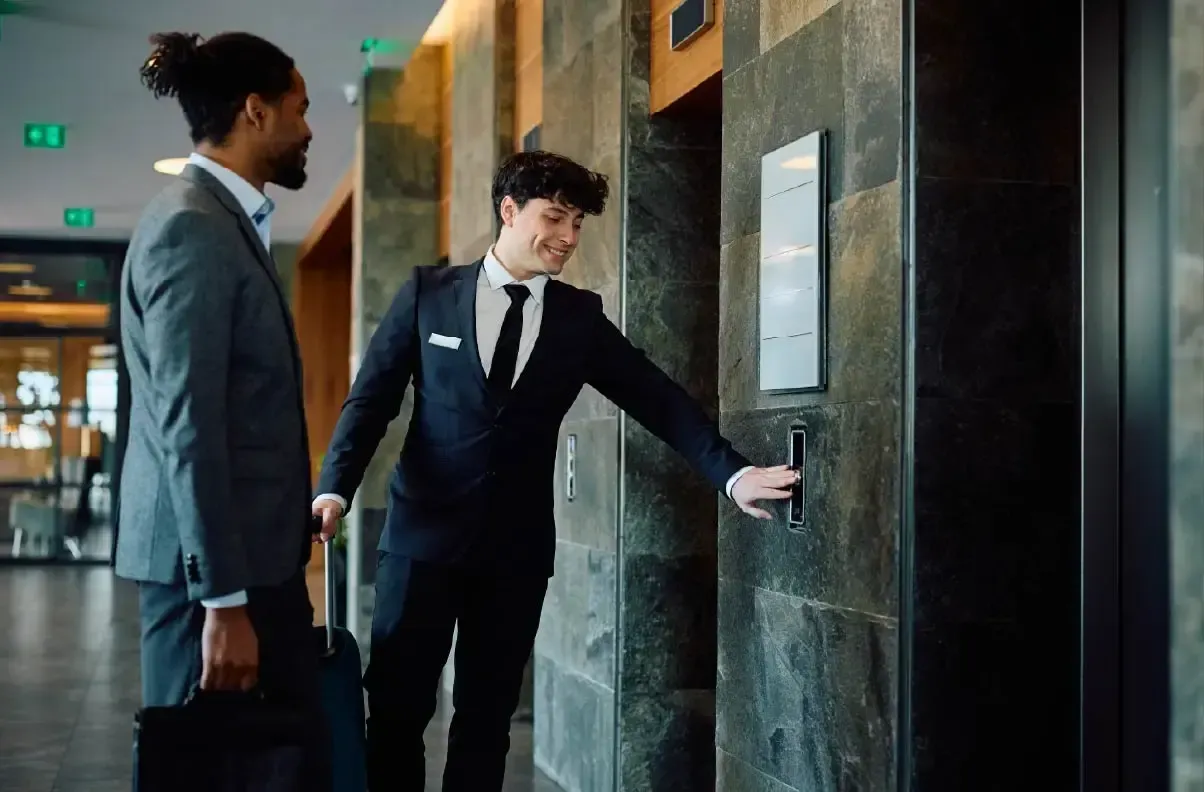The hospitality experience starts with good customer service. The more exceptional the service, the more likely you are to achieve customer satisfaction and customer loyalty. By exceeding and anticipating expectations, you offer the type of service that ensures repeat business.
We'll look at everything relating to hospitality customer service, including why it's important, the key characteristics, the challenges, and how to improve it with integrated technology.
What is customer service in hospitality?
Customer service in hospitality isn't just about helping guests get what they want. It's about making sure there is nothing getting in the way of them having the best memorable experience possible.
It goes beyond a simple transactional service. It requires communication skills and empathy to understand what customers need and to resolve issues quickly, and going the extra mile to leave a lasting impression on guests.

Why is customer service important for hospitality businesses?
In hospitality, customer service is based on the customer experience. From the moment they check-in, guests are met with a welcoming environment - the front desk greets them with a smiling face and is on hand to solve any issues that might arise to mitigate the risk of a negative experience (or review).
It's a proactive approach that focuses on high-quality, personal touches from staff members that exceed guest expectations. This helps create the emotional connection that is such a big part of the hospitality sector.
Customer service is important for the long-term success of your hotel because it differentiates your brand from the competition, leading to positive reviews, retention, word-of-mouth marketing through social media and overall satisfied customers.
In short, guest satisfaction directly impacts your bottom line.
What are the key characteristics of excellent customer service?
There are many key characteristics of excellent customer service, one of which is to find ways to create guest interactions that leave a lasting impression through personalized experiences. No matter what function your staff has, great customer service starts with human connection. It's that smile when a staff member is passing by a guest, it's greeting guests by name; it's about anticipating guests needs.
Proactive conflict resolution
Anticipating potential issues before they become problems is key to great customer service. This can be achieved by having a detailed hotel maintenance checklist that helps identify where you need to put your efforts in preventative maintenance. A lot of conflict resolution comes from creating training programs designed to guide your staff in how to mitigate problems. Having a "guest is always right" mentality can help, and ensuring hotel management will step in should you need it.
Streamline services
The more streamlined your hotel operations are, the more you can ensure there's not lag-time in room service, check-in, check-out, processing payments, and any other services you are providing, whether that be bar or restaurant, spa or pool. If there is an issue, resolving it quickly will help show guests that you care and create loyal customers that feel valued.
Go above and beyond
Going above and beyond in hospitality management by providing excellent service is fundamental because it's what sets you apart from the competition. Creating hotel guest profiles can be a great way to do this because it keeps a register of guest preferences. Whether it's a preference about room type, music, air conditioning, or leaving extra amenities, anticipating the needs of your guests is key to great customer service.
Empathy
Empathy is one of the most important customer service skills because you put yourself in the guest's shoes and can feel what they feel. Imagine after a long trip, a guest has requested early check-in and the room isn't ready. By understanding how they feel, you will be able to provide more empathetic solutions to their problems, like an upgrade to a room that is ready, and make them feel seen and heard.

How can hospitality businesses improve their customer service?
Hospitality businesses can improve their customer service by
- Creating staff training initiatives that focus on communication, empathy and problem-solving
- Having weekly meetings where they analyze problems, examine how staff solved them, and how they could improve for the next time
- Taking note of guest preferences through personalization
- Embracing technology like a virtual assistant, online-check-in, check-in kiosks, digital payments and keys
- Empowering staff with the right tools to handle issues so that they're more confident and proactive
- Collecting customer feedback to address key issues and follow up with guests and give kudos to staff that got positive feedback from guests
What can Mews do to improve your customer service?
Mews can help improve customer service by streamlining operations, allowing you to forget about menial tasks and enabling your staff to focus on the guest experience rather than manually inputting details. With real-time communication, you can also ensure your various departments are on the same page all of the time.
For example, when a room is ready for check-in, your staff can use mobile housekeeping software to check off the room and notify the front desk it's ready for check-in. This decreases lag time between when a guest arrives and when they can get to the room, boosting customer satisfaction.
A virtual concierge can improve service enactment time, ensuring that requests are quickly and efficiently responded to, and also enable staff to answer guest questions in real-time.
Main challenges in customer service in the hospitality industry
Of course when you're dealing with a public-facing business, challenges will arise.
One of the main challenges in the hospitality industry is the high turnover rate. It can make it incredibly difficult to keep service consistent, as you're constantly training new staff. This then leads to poor customer service and long wait times. And when your staff know they won't stay long where they are, they'll lack any motivation to take initiative.
Another challenge is the digital transformation that the hotel industry is undergoing. New tools require extra training and if some of your staff aren't up to the challenge, it can slow down operations. Additionally, high guest expectations mean guests expect faster, more digitalized experiences like smart technology in rooms, which can be costly and hard to implement.
Social media can also present a challenge to hotels. Guests are eager to share everything about their experiences online, which can make it difficult to mitigate bad reviews and ultimately lead to lost business.
Conclusion: The importance of customer service in hospitality
We've looked at the importance of providing outstanding customer service to create the kind of guest experience that leaves them wanting to come back for more. By offering quick and effective resolutions to issues in real-time, creating a welcoming environment on behalf of all your team members, and being consistent in your service, you can be sure to stand out from the competition and be successful in the long-term.
Download our guide 'Perfecting Guest Communication'

Written by

Jessica Freedman
Jessica is a trained journalist with over a decade of international experience in content and digital marketing in the tourism sector. Outside of work she enjoys pursuing her passions: food, travel, nature and yoga.










